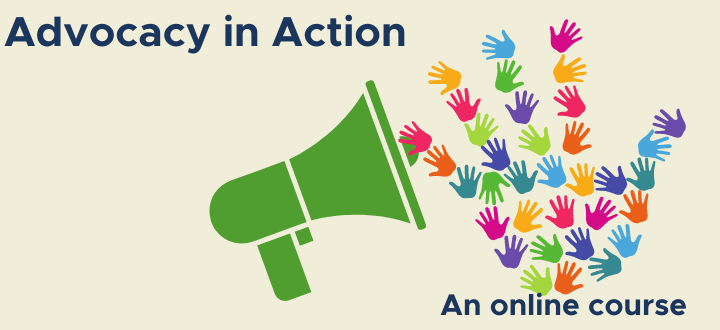
Advocacy in Action
SOPHE has trained more than 2,000 advocates at annual advocacy summits. Using this expertise, SOPHE has developed an online advocacy course, Advocacy in Action.
In four modules, this course teaches participants how to build broad support for advocacy campaigns among community stakeholders and policymakers.
Key topic areas and skills are covered in approximately four, 30-60 minutes of presentations, examples, videos, and self-examinations.
Participants discover the tools to take action:
• Introduction to health policy and advocacy
This module covers differentiating the terms: policy, advocacy, and lobbying and their linkages and importance to health education specialists. Case studies illustrate policymaking.
Upon completion, participants can:
- Explain the difference between policy, advocacy, and lobbying.
- Define common terms used in advocacy.
- Identify the functions of governmental branches.
- Explore the legislative process and diverse methods of influencing the legislative process
Apply the role of advocacy in public health. - Explore the linkages between public health policy and other areas of public health (epi, research, etc.).
• Setting an advocacy agenda for Policymakers
This module covers developing an agenda, prioritizing issues, reliance on mission statements, resolutions, policy databases, etc. Case studies include successful and failed campaigns.
Upon completion, participants can:
- Explain the policy agenda and agenda setting process.
- Identify how to prioritize potential advocacy issues (internal and external).
- Explore how communication/messaging can determine success or failure in agenda setting.
- Apply health communication theory to health policy agenda setting.
- Identify appropriate communication channels for the policy message.
- Articulate successful communications strategies in meetings with policy makers.
• Introduction to Coalition Building
This module is an overview of the six major steps in building and sustaining a coalition and its role in changing policy. A strong base of support is the active ingredient that can move an issue from the back burner to the front of a community, eventually leading to policy change.
Upon completion, participants can:
- Discuss the role of coalitions in grassroots advocacy strategies.
- Identify five characteristics of effective coalitions.
- Explore the potential benefits and challenges of working in coalitions.
- Identify action steps from coalition building through coalition actionable activities.
• Developing & Implementing an Advocacy Day at the State and Local Level
This module provides an overview of applications and resources taken from successful playbooks of the AIDS Foundation of Chicago and/or HIV Prevention Justice Alliance. These organizations have mastered techniques.
Upon completion, participants can:
- Identify appropriate local advocacy targets.
- Identify appropriate advocacy messaging techniques.
- Articulate advocacy asks in appropriate messaging formats.
$95 for 7.5 entry-level continuing education contact hours. Resources are provided at the end of the course.
Enroll now
The National Commission for Health Education Credentialing, Inc (NCHEC) designates SOPHE as a provider of continuing education contact hours. SOPHE is subject to the application and adherence to policies regarding continuing education contact hours.
Individuals can earn continuing education contact hours by participating in experiences that aid in the development or enhancement of the knowledge and skills directly related to the Areas of Responsibility and their professional occupation.


